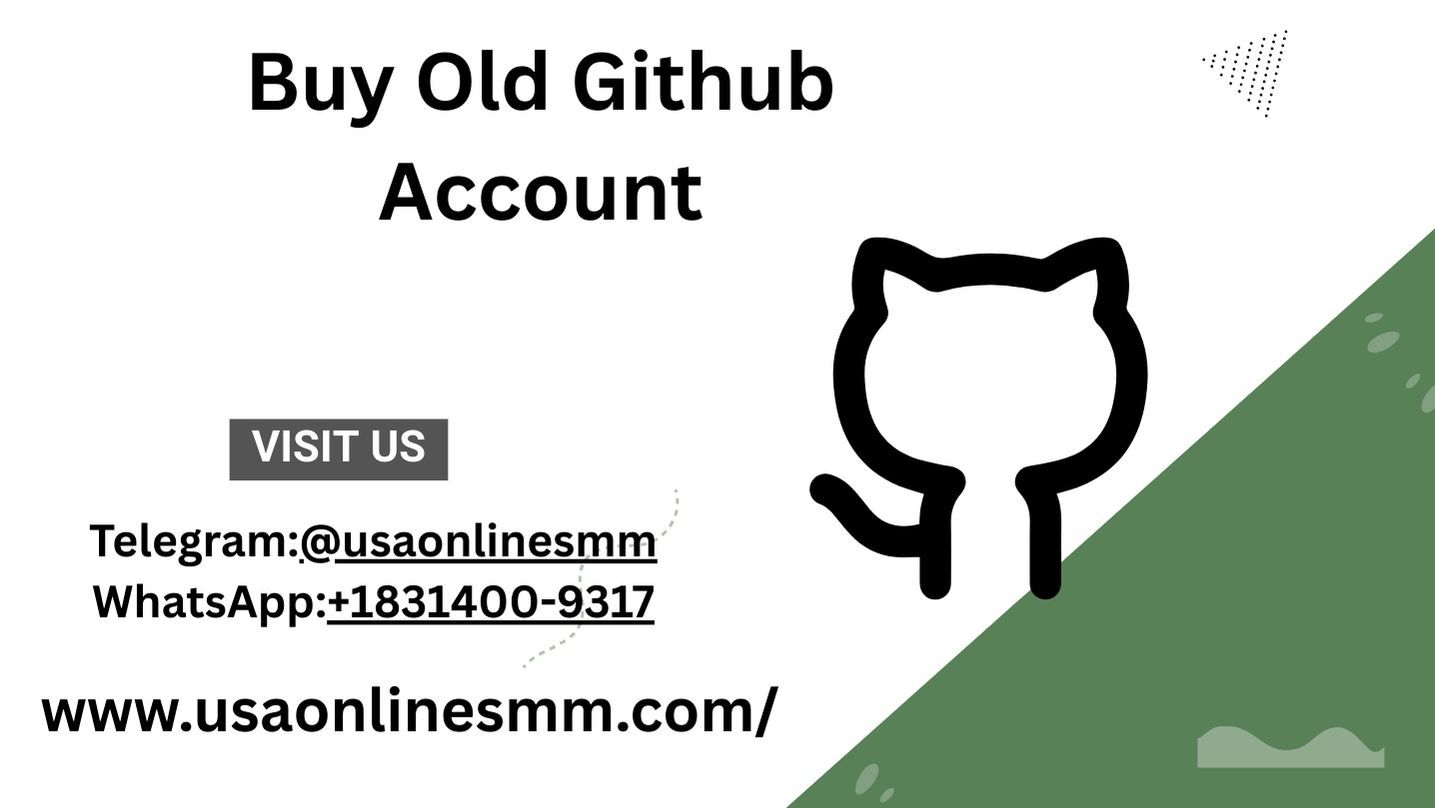Buy Old Github Account
GitHub has become one of the most essential platforms for developers, startups, and companies looking to manage their software development efficiently. It provides a collaborative environment where programmers can share code, contribute to projects, and showcase their technical skills. Over the years, GitHub accounts gain credibility through contributions,
If you want to more information just knock us 24-hour reply
**
Telegram*:@usaonlinesmm*
WhatsApp:+1831400-9317**
repositories, and network activity, making older accounts highly valuable. Buying old GitHub accounts has emerged as a practical solution for businesses and individuals who want to leverage established accounts for projects, visibility, or credibility.
Understanding the Value of an Old GitHub Account
Older GitHub accounts carry weight in the developer community. Unlike newly created accounts, these accounts often have a history of contributions, stars, forks, and followers that reflect experience and engagement. This history can be advantageous for developers looking to quickly gain credibility in the open-source world. Businesses may also use old GitHub accounts to enhance trust in their projects, as accounts with long-standing histories are perceived as more reliable.
The value of an old GitHub account is not just in its age. Repositories with multiple forks, starred projects, and well-documented code contribute to its overall appeal. Such accounts can accelerate visibility in GitHub search results, improving the reach of new projects associated with them. This advantage is particularly beneficial for startups and freelance developers who want to establish authority without spending years building a presence from scratch.
Benefits of Buying an Old GitHub Account
One of the key benefits of acquiring an old GitHub account is the instant credibility it provides. Developers and businesses can bypass the slow process of growing an account organically. Established accounts often come with followers, which increases the likelihood of contributions being noticed and adopted. For developers entering new niches or technologies, this pre-existing network can open doors to collaborations and partnerships.
Old accounts can also provide better positioning in search engines and GitHub’s internal search algorithms. GitHub rewards consistent contributions and reputable accounts, meaning that projects hosted on older accounts have a higher chance of visibility. This can lead to more stars, forks, and attention from the developer community, ultimately resulting in faster project growth and recognition.
Furthermore, businesses looking to showcase their work or offer open-source tools can leverage old accounts to demonstrate long-term involvement in software development. A profile with a strong history sends a positive signal to potential clients, investors, and collaborators. It also allows organizations to maintain multiple projects under credible accounts, diversifying their presence in the software development ecosystem.
How to Identify Authentic Old GitHub Accounts
Purchasing an old GitHub account requires careful evaluation to ensure authenticity. An authentic account should have a well-documented history of contributions, including commits, pull requests, and active repositories. Buyers should check the account’s interactions with other developers, including comments, reviews, and merged contributions. A strong social footprint indicates genuine activity rather than artificially inflated numbers.
The quality of repositories is another critical factor. Accounts with numerous high-quality, well-documented repositories are generally more valuable than those with minimal or incomplete projects. It is also essential to verify whether the account adheres to GitHub’s guidelines and policies. Accounts flagged for violations or spam activities can negatively impact your reputation and may face restrictions from GitHub.
Finally, buyers should consider the niche and specialization of the account. Accounts with contributions in relevant technologies or industries offer more value, especially if the buyer intends to continue working in similar domains. Evaluating the account’s relevance to your goals ensures that the purchase aligns with long-term objectives, avoiding unnecessary risks.
Risks and Considerations When Buying Old GitHub Accounts
Despite the advantages, buying old GitHub accounts comes with risks. The most significant concern is account security. Buyers must ensure that the account is transferred securely and that credentials are changed immediately. Using accounts obtained through unreliable sources can expose buyers to hacking attempts or misuse, jeopardizing their projects and reputation.
Another risk is GitHub’s terms of service. GitHub strictly prohibits the sale of accounts, and violating these terms may result in permanent suspension. Buyers should carefully review the platform’s policies and consider alternative methods, such as collaborating with account owners or creating verified organizational accounts, to mitigate potential consequences.
Additionally, not all old accounts provide the expected benefits. Some accounts may appear credible but have low engagement or outdated repositories. Buyers should thoroughly analyze the account’s activity metrics, such as stars, forks, and followers, to ensure that it delivers real value. Assessing the account’s potential impact on project growth is crucial before making a purchase.
Steps to Securely Buy an Old GitHub Account
Securing an old GitHub account begins with identifying reliable sellers or marketplaces that specialize in account transfers. Transparent communication with the seller is essential to confirm account history, activity levels, and any potential restrictions. Buyers should request screenshots, activity logs, or portfolio links to verify authenticity.
Once verified, account credentials should be updated immediately. Changing passwords, enabling two-factor authentication, and reviewing connected applications are essential steps to ensure security. Buyers should also transfer associated email addresses and confirm account recovery options to maintain control over the account in case of future issues.
It is advisable to document the purchase process, including agreements, payment receipts, and correspondence with the seller. This documentation can serve as proof of ownership and help resolve disputes if they arise. Secure transactions and careful documentation minimize risks and establish a trustworthy transfer process.
Leveraging Old GitHub Accounts for Personal Growth
For developers, acquiring an old GitHub account can accelerate personal growth by providing access to advanced repositories and collaborative networks. Engaging with existing projects allows developers to contribute to high-quality codebases, learn from experienced programmers, and enhance their skills more rapidly than starting from scratch.
Old accounts can also be used to showcase personal projects effectively. By associating new work with an established profile, developers increase visibility and credibility. This strategy can attract attention from potential employers, collaborators, or clients who value proven contributions and consistent engagement in the software development community.
Additionally, old GitHub accounts often have followers and connections within specific niches. Developers can leverage this network for mentorship, collaboration, and knowledge sharing. Active participation in discussions, pull requests, and issue tracking helps build a professional reputation, expanding opportunities in both open-source and commercial projects.
Using Old GitHub Accounts for Business Advantages
Businesses can strategically use old GitHub accounts to enhance brand presence, promote open-source projects, and attract developer talent. By associating organizational repositories with established accounts, businesses gain credibility in the eyes of clients and industry peers. This credibility can influence decision-making processes, partnerships, and investment opportunities.
Old accounts can also improve project visibility on GitHub. Platforms like GitHub prioritize well-established accounts with active engagement, meaning that projects hosted on these accounts are more likely to gain traction. Increased visibility translates into more contributors, higher adoption rates, and better community support, all of which contribute to long-term project success.
Furthermore, businesses can use old accounts to showcase consistent contributions to open-source initiatives. Demonstrating long-term involvement in development fosters trust and positions the organization as a responsible and experienced player in the tech ecosystem. This strategy can be particularly useful for attracting skilled developers, building communities, and strengthening brand recognition.
Ethical Considerations in Buying Old GitHub Accounts
Ethics play a significant role when buying old GitHub accounts. Users should consider the implications of acquiring accounts without consent or through unauthorized means. Maintaining transparency with sellers and adhering to GitHub’s policies ensures responsible use of purchased accounts.
It is also important to respect the original content of repositories. Buyers should acknowledge the contributions of previous owners, especially when inheriting open-source projects. Proper attribution, license compliance, and clear communication with contributors help maintain the integrity of the developer community and foster positive relationships.
Developers and businesses should focus on using old accounts to enhance productivity and learning rather than circumventing skill development or reputation-building processes. Ethical usage strengthens credibility, builds trust, and ensures sustainable growth within the GitHub ecosystem.
Alternatives to Buying Old GitHub Accounts
While buying old GitHub accounts offers immediate benefits, there are alternative strategies to achieve similar results ethically. Developers can collaborate with existing account holders, contribute to reputable open-source projects, and gradually build their presence. This approach provides authentic credibility without violating platform policies.
Businesses can create organizational accounts and invest in consistent contributions to establish long-term authority. Engaging with the community through sponsorships, mentoring, and active participation helps build trust and recognition over time. These alternatives reduce risks associated with account purchases while fostering genuine engagement and growth.
Networking with developers, participating in coding competitions, and contributing to trending repositories are also effective ways to build a strong GitHub presence. While these methods require patience, they offer sustainable results and strengthen professional reputation within the software development ecosystem.
Conclusion on Buying Old GitHub Accounts
Buying old GitHub accounts can be a valuable strategy for developers and businesses seeking instant credibility, visibility, and network benefits. The age, activity, and quality of contributions make these accounts attractive for accelerating personal growth and promoting projects. However, this approach carries risks, including security concerns and potential violations of GitHub’s terms of service.
Careful evaluation, secure transaction processes, and ethical usage are essential to maximize the benefits while minimizing risks. Alternatives such as collaboration, consistent contributions, and network building offer sustainable paths to credibility and recognition. Whether used for personal development or business growth, old GitHub accounts provide unique opportunities for those who approach the process responsibly and strategically.






Discussion (0)